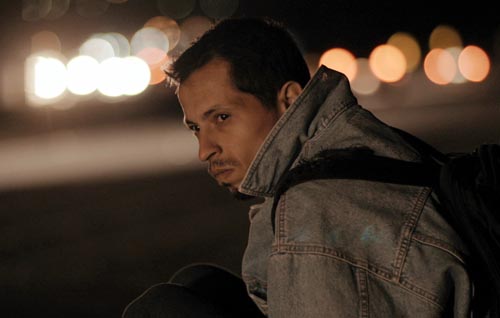
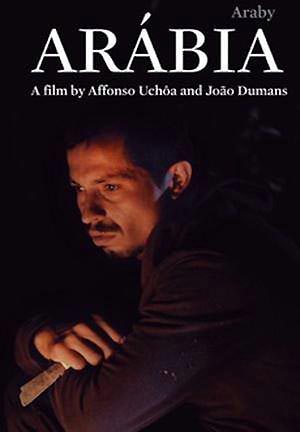 By Roger Costa
By Roger Costa
A letter sent from a mother longing the presence of her son, describes her sorrow, “When I hear some kids are getting arrested, I feel glad you are away, tracing a different path, looking for dignity, and I hope everything goes well”. That’s the primary essence of this seductive, melancholic and absorbing meditation in what means to be a working class man living in the countryside of Minas Gerais state in Brazil. There are two stories that develop within co-directors João Dumans and Affonso Uchoa’s first collaborative work, both depicting manhood with profound sensibility and accurate insights. They also cause a tremendously vigorous first impression with the film’s stylish techniques, sumptuous cinematography, the long contemplative shots at the players’ facial emotions, a delicate acoustic guitar score, precious soundtrack with Brazilian classics and American folk music, the coordination with the talented cast, and mostly, the editing of the natural sounds of the countryside and the poetical and compassionately intriguing narrative. First, the directors observe two brothers, living alone and coping with their parents absence; they live in an area surrounded by emptiness, factories, old people and hopelessness. The youngest one makes a striking confession as he justifies his doubts regarding his faith mentioning the world is full of suffering and deaths. The oldest wouldn’t disagree, as he’s also affected by the sense of abandonment. They are briefly monitored by their aunt, a woman who serves as the village’s nurse and is engaged in the local workers’ lawful interests.
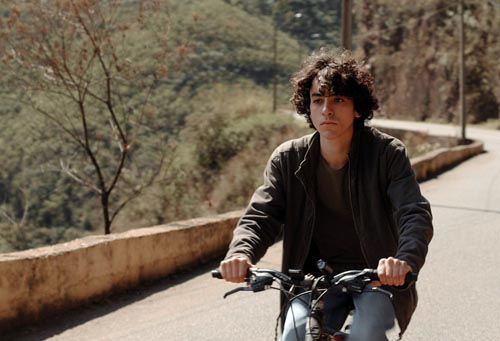
Suddenly a worker collapses in the factory, and looking through the man’s things in search of his identification card, he finds a journal, and taken by curiosity starts reading the man’s fascinating road trip story. Then, the narrative enters the life of Cristiano (played by Aristides de Sousa), an ex-thug in search of reboost and redemption. He was caught by Police during a failed robbery attempt, and after spending years in jail, he decides moving from the big crowds of Belo Horizonte to seek a new beginning, venturing in many jobs, meeting life-changing and inspiring people, mentors and rivals, as well as Ana, the woman who dominated his heart. In this atmosphere, the directors infuse a semi-documental structure, following Cristiano through his journey of hard labor, depicting the working-class crisis, the era of unemployment and competitiveness, collecting important messages of survival and comradeship from philosophies exchanged among men, and testimonies and perspectives on ourselves; in one case, a farmer describes the difficulties of life, comparing the impactful changes of values in the past and in the present, declaring “the land is the same, but everything is strange and different”.

Through the revealing ordinary story of Cristiano, the directors also make a political statement, witnessing the physical and emotional consequences of hardworking men, unpaid laborers, putting up efforts to survive the capitalism system even at an isolated, forgotten area. This aspect intensifies as Cristiano is constantly moving around, changing locations and hitchhiking, dealing with injustices and risks, building up a mutable road movie experience, shot with breathtaking angles and purely contagious honesty.
In a somber twist, the film presents an accident on the dark road, so marvelously structured that points to another accomplished aspect in the directors vision: the uncertainty, the unexpected, the mastery of suspense. One must really be attentive to the sequence, as it won’t reveal many details about the occurrence; it only observes from a certain distance, but it reveals a lot, especially the directors’ powerful control of the material. The accident somehow links to Cristiano and Ana’s love affair, becoming part of the obstacles surging in their way.
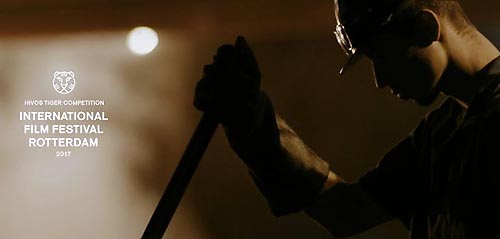
ARABIA is a smart, sensitive, well-crafted journey of redemption, dignity and love. It is a magnificent exploration on the inner emotions of a man and his need of reconciliation with himself and his essence. It has so much confidence in its aesthetic, as it doesn’t rely on any sexual and violent sensationalism to attract, a rare case among contemporary Brazilian filmmakers. Instead, João Dumans and Affonso Uchoa deposit their trust on their subject, the man, the factory, the turbulent emotions, conceiving a magically and purely humane bitter-sweet tactful tale about a new beginning.
(ARABIA/ARABY is an Official Selection of New Directors/New Films 2017. It screens on Saturday March 18th at Film Society of Lincoln Center, and Sunday March 19th at MoMA.)



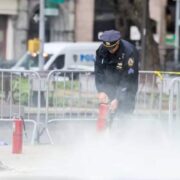















Comments